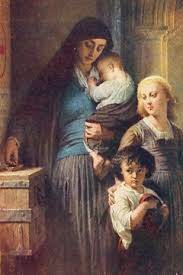Strange, what some can see and others cannot. In a letter to his son Christopher, written during the Second World War, J. R. R. Tolkien, the author of The Hobbit and The Lord of the Rings Trilogy, observed, “If anguish were visible, almost the whole of this benighted planet would be enveloped in a dense dark vapour shrouded from the amazed vision of the heavens!”
Like Louis Armstrong, I firmly believe that, “it’s a wonderful world,” though Tolkien is nonetheless right about the ubiquity of anguish, covering “almost the whole of this benighted planet.” Consider this curiosity, and its cause, noted this past week in The New York Times.
So much anguish! Why isn’t it the most apparent feature of our world? Perhaps the human heart can only hold so much pain, before it closes itself to more. Perhaps, as the faith teaches, sin blinds us. It leads us to think that anguish is the way of the world. Maybe denial is our strongest defense, our only surety against anguish. Or is anguish so ever-present, the human spirit simply can’t envision a world without it?
Strange, what some can see and others cannot. Christ marked what his fellows missed.
If we take the story seriously, as did the church, which remembered the scene and recalled our Lord’s words, this is the end for the widow. She has no more to give. Even her life of want now wanes.
We erect monuments to men who gave all, who made the final sacrifice. Rightly so. But it is no diminishment of battle’s anguished death to note that its singular mercy is the knowledge that the end has come. One can meet death and say, like Christ upon the cross, “It is finished” (Jn 19: 30).
But what happened to this widow who “contributed all she had, her whole livelihood?” What happens to the woman, raising a family on her own, who doesn’t know how they will survive? How much longer she can continue? What of those moments in life when we do not know how to persevere, when life has drained us, and yet death withholds its mercy? How does one go on, when there is no “on?” How does one live in the abandonment of an end that will not come?
When does the last coin drop, and how does one prepare for that final moment? The widow knew that she had given her last coins. She was ready for what would come. How did she do it?
She had lived her life, dropping coins into the temple treasury, ultimately, into the mystery, which had created her and endowed her life with whatever love and meaning it possessed. She had lived her life open to the God of Israel, a mystery that demanded so much.
The last day of life is like those that precede it. Either we open ourselves to the mystery or we withdraw into the citadel of the self. For the human person, who is created to be open—to the world, to others, to God—such a retreat, into the self, is truly the end.
1st Kings 17: 10-16 Hebrews 9: 24-28 Mark 12: 41-44








